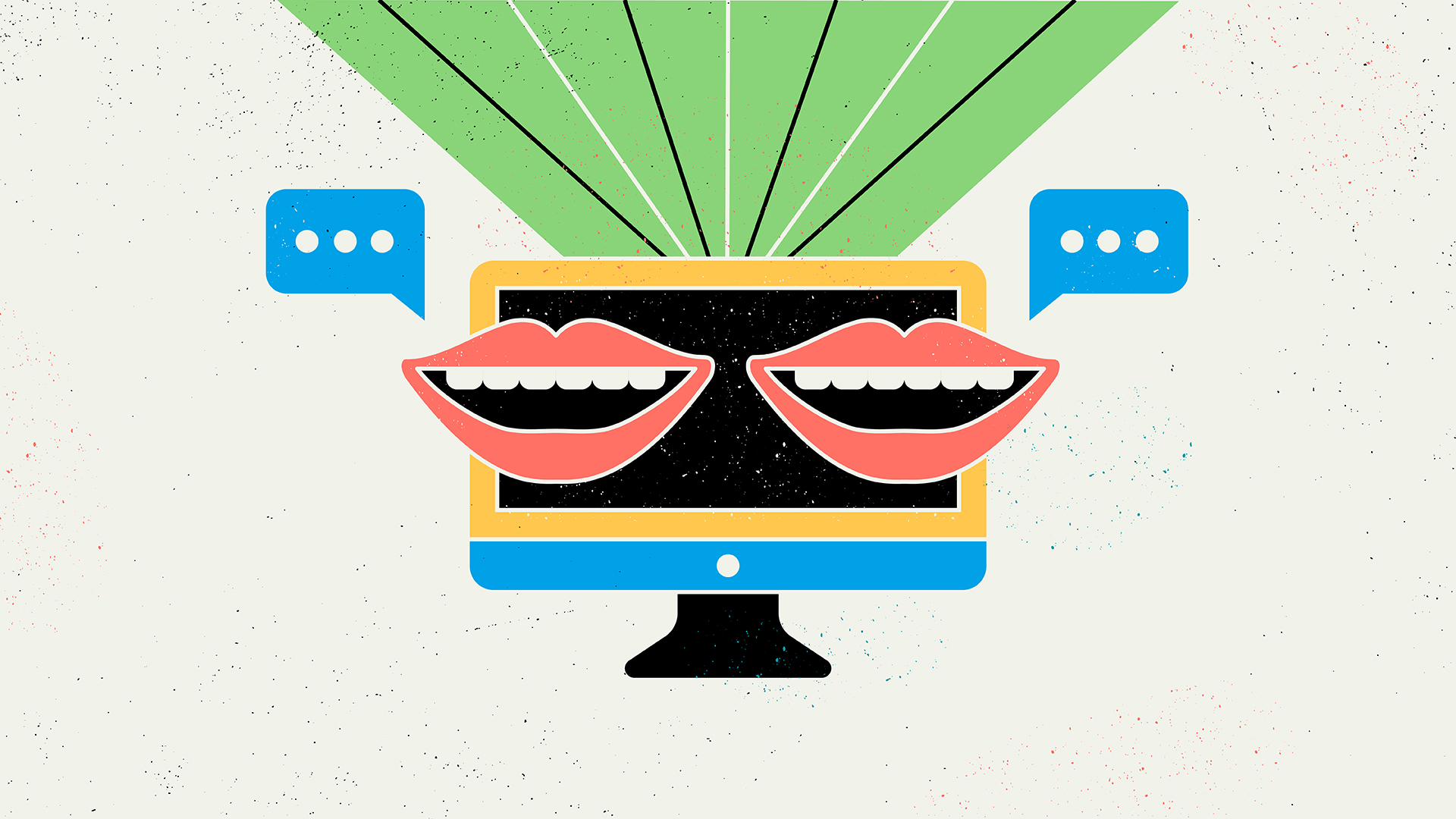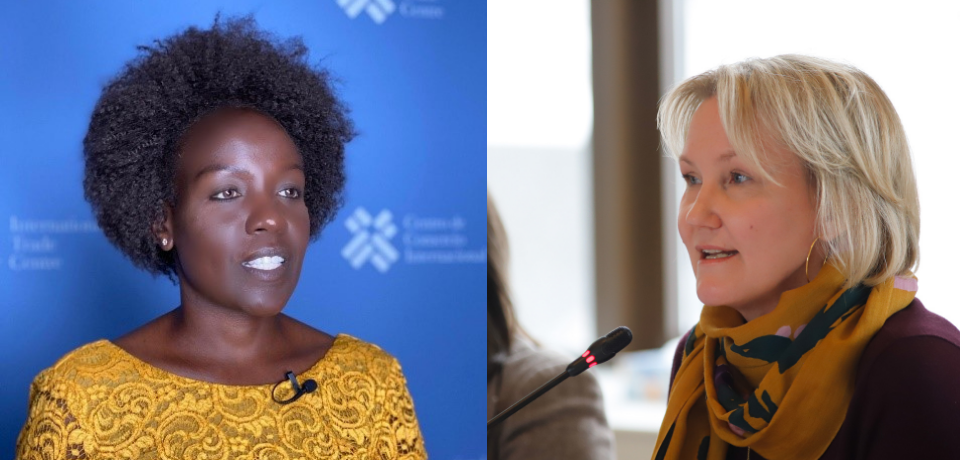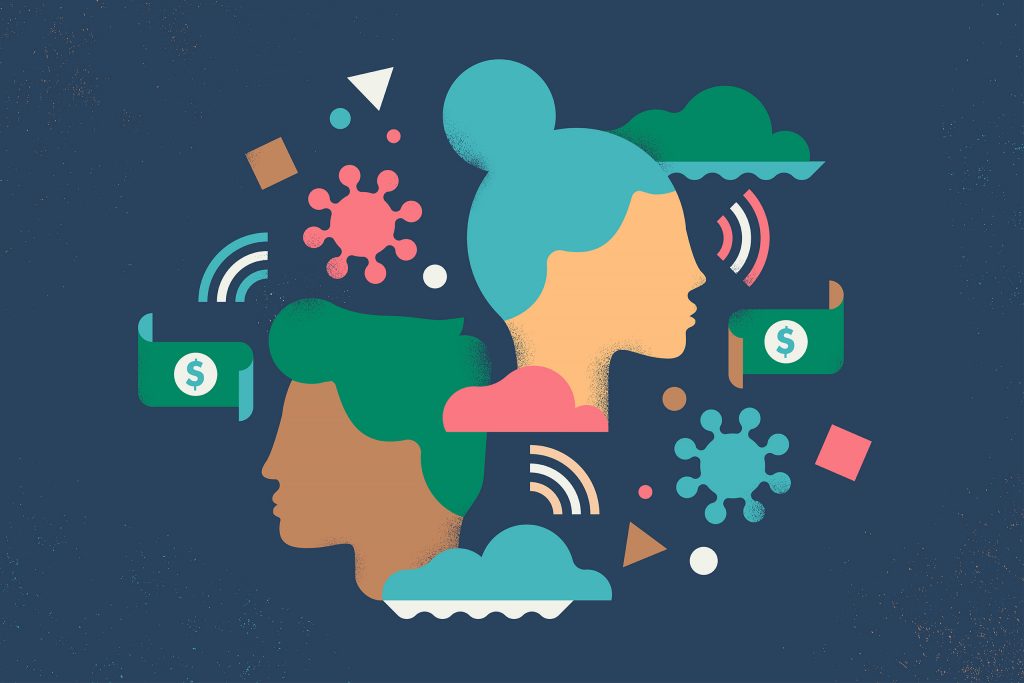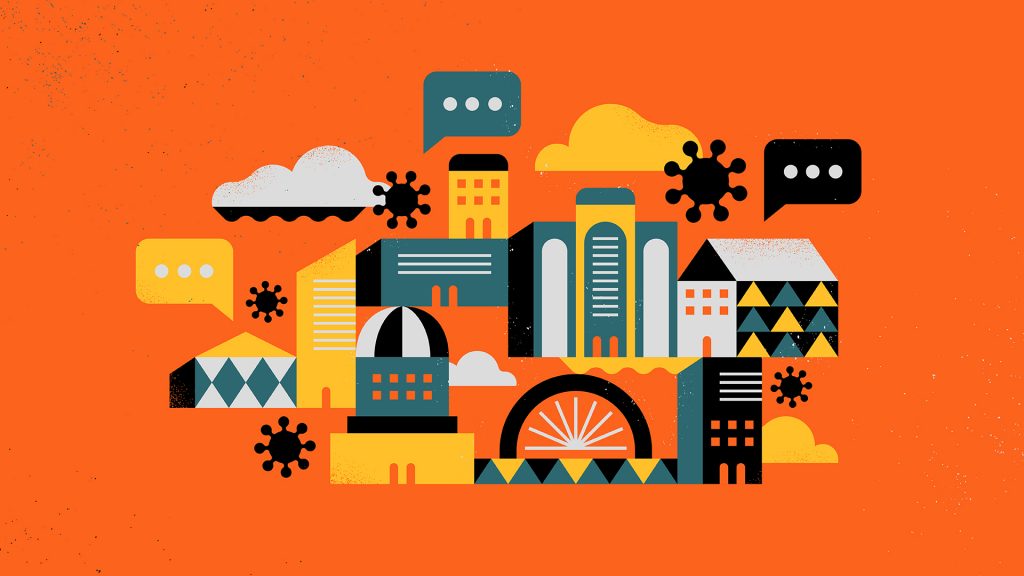Aleem Walji
Radhika Shah, Co-President Stanford Angels & Entrepreneurs, Advisor SDG Philanthropy Platform and Illumen Capital, Board member, Center for Effective Global Action, U.C Berkeley, Fellow Center for Human Rights & International Justice, Stanford.
Radhika Shah
Radhika Shah, Co-President Stanford Angels & Entrepreneurs, Advisor SDG Philanthropy Platform and Illumen Capital, Board member, Center for Effective Global Action, U.C Berkeley, Fellow Center for Human Rights & International Justice, Stanford.

Illustration by Brandon Serbec
When social media platforms entered our lives nearly two decades ago, these start-ups promised us a greater sense of connection, in addition to connectivity. This promise has not been fully realized. Rather than expanding our worldviews and challenging our beliefs, media and digital platforms have created social bubbles that reinforce what we already believe and drive us away from those with whom we disagree. The current COVID-19 crisis has made this all the more stark. We are all consuming facts from different sources. When those facts are inconsistent and the truth is unclear, we retreat into what we want to believe – further siloing our perspectives – and we fail to understand how others could disagree.
In a democracy, this is very dangerous. Limiting access to divergent views constrains our ability to weigh differing arguments and come to our own conclusions. How can we refine and expand our thinking if we do not engage with those with whom we disagree? As protests rage in the United States against the tragic death of George Floyd, and coronavirus continues to impact the most vulnerable among us, there is urgency to finding common ground and deepening our understanding of our very different circumstances.
Technology platforms, built with connection at their core, have a key role to play. By widening our aperture and expanding what we watch, read, and encounter online, digital platforms can help us better understand others by building on what we share and what we value.
Diversity is a fact; pluralism is a conscious choice
We must not forget that the United States was built on the foundation of E Pluribus Unum or Out of Many, One. History has shown us time and again that a rich exchange of culture and ideas creates prosperity, vibrancy and resilience against shocks. On the ancient Silk Road, the wealth of cities spanning China, Central and South Asia, Persia, East Africa, and Europe can be attributed to an intensity of trading and sharing of culture. The Mughal emperor Akbar expanded his rule over much of the Indian Subcontinent by embracing pluralism and appointing scholars from many religious traditions to his court. In the Silicon Valley today, it is the convergence of diverse ideas and cultures, infused by immigrants, that has created intellectual richness and resounding economic success. Technology giants must recognize and celebrate the diversity that has underpinned their success, and reinforce the value of a diversity of ideas and viewpoints.
Valuing diversity and respecting difference does not mean always agreeing with one another. Building socially cohesive societies is hard work. While we may value diversity in the food we eat and the music we enjoy, we are often less comfortable with diversity in how we practice our faith, express our political views, or educate our children. But the very foundation of democratic societies is the ability to listen to one another and disagree respectfully, while maintaining social cohesion. It is about creating a shared sense of belonging that cuts across differences.
His Highness the Aga Khan, Chair of the Board of the Global Centre for Pluralism, said, “Diversity is not a reason to put up walls but rather to open windows. It is not a burden, it is a blessing. […] When the question of human identity is seen in this context, then diversity itself can be seen as a gift. […] The work of pluralism is always a work in progress.”
Diversity is an irreversible fact in an interconnected world, while pluralism is a conscious choice. Pluralism is about embracing difference as a source of value and strength. Building a genuinely pluralist society will always be a work in progress. What is the alternative? Rather than a social order of openness and respect for difference, we could revert to a society marked by division, lack of trust, and conflict. Is this the world we wish to co-create? Today, as we emerge from COVID-19, and witness social and political unrest all around us, we are reminded of how interconnected we are. The well-being of one of us depends on the well-being of all.
Algorithms for solidarity, empathy and peace
Tech companies can support pluralism in society by reimagining online communication as an enabler of social cohesion, empathy, and shared prosperity. How do we ensure the virtual spaces we create and curate encourage a plurality of views to be heard and respected across dividing lines of race, class, gender, and faith? How do we ensure that data sets feeding artificial intelligence and machine learning are not from biased sources and further amplified by algorithms?
Extreme viewpoints spread at lightning speed and misinformation is a growing risk to peace and stability. A recent study at Stanford University published by the National Academy of Sciences focused on how racial bias influences investors’ financial judgments. Beyond influencing investment decisions, there is a real risk that the convergence of algorithms and a narrowing of views in the top echelons of power will scale-up human biases and misinformation.
While there is considerable discussion about the need for inclusion and more equitable access to technology and data, this is largely about hardware, connectivity, data privacy, and digital literacy. There is little attention paid to the inclusion of different perspectives online, by seeking out marginalized voices and creating spaces for civil dialogue. Why can we not create algorithms that privilege inclusion, that unpair new searches from our search history, and that present us with content that is different from what we regularly consume? If artificial intelligence and machine learning can help us filter our searches, they could surely help us unfilter the information we consume, create new lenses with which to view content, and open up spaces for us to engage those with whom we disagree.
It is time for technologists to take more responsibility and work with civil society, philanthropy, regulators, and educators to counter the forces that lead to division and misunderstanding. Expanding on positive efforts to stop hate speech and arrest the spread of misinformation online, it is time to build platforms and algorithms that scale solidarity, empathy, and peace, and undercut division, xenophobia, and violence.
Pluralism online must be seen not merely as a positive feature of a virtual world but as an indispensable foundation for peace and human progress. Mahatma Gandhi once said, “Our ability to reach unity in diversity will be the beauty and test of our civilization.” As we reimagine ourselves and our societies in a post-covid world, digital platforms, diverse data sets, contrasting viewpoints, and a pluralistic ethos should be the new normal.




